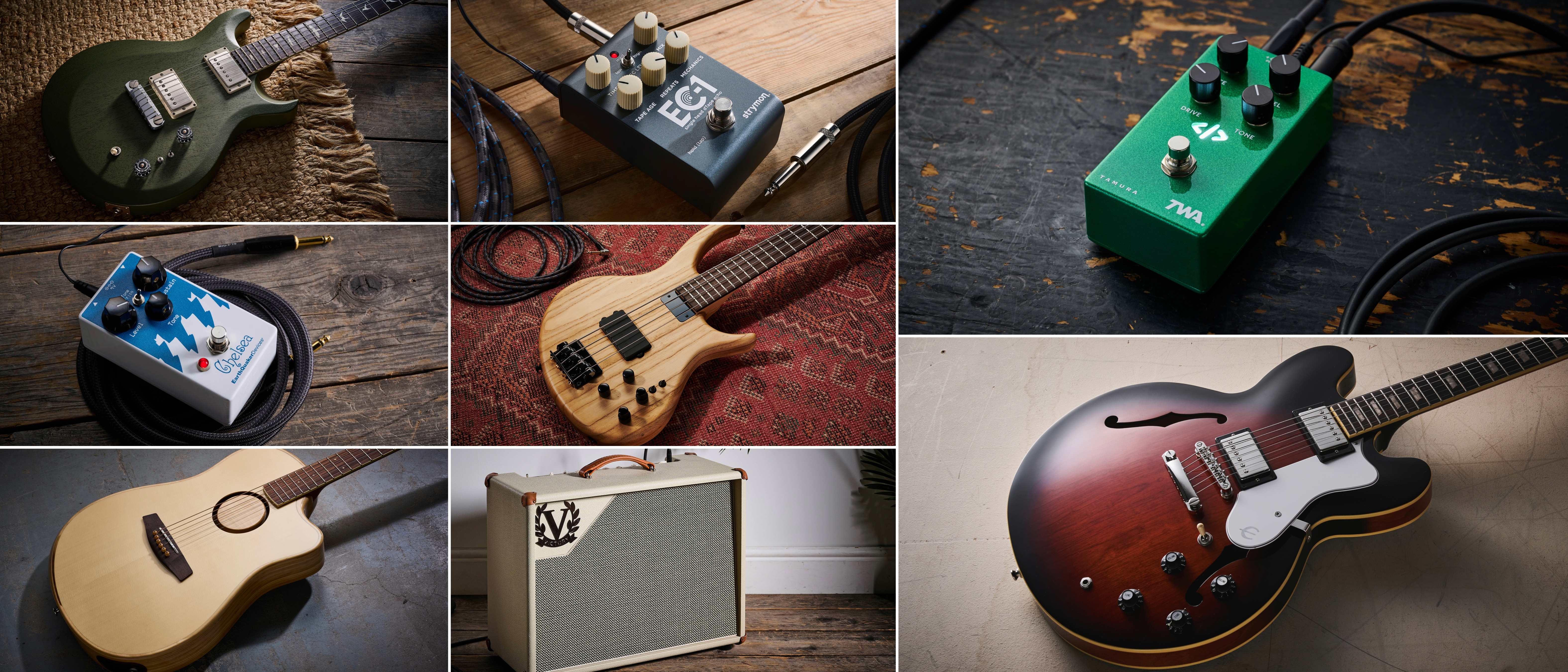Something For Kate: "If I’m listening to a record that came out in 2020, I want to listen to a record that sounds like 2020!"
Something For Kate are back with an epic new album of big, lush musical atmospheres and warm, kaleidoscopic melodies: exactly what this clusterf*** of a year has needed

It's been a great year for comebacks, hasn’t it? I mean, the world as we know it may be rapidly decaying beneath our feet, but at least all our old favourite bands have swung back into action to help beef up our doomsday playlists!
One such act making quite a fitting addition to the fray is Melbourne’s pop-rock powerhouse Something For Kate. Their first album since 2012’s Leave Your Soul To Science is a broad, booming epic of brittle keys, beautiful strings, boisterous drum beats and belting guitar riffs – soundscapes that sprawl out into the horizon as Paul Dempsey [vocals and guitar], Steph Ashworth [bass] and Clint Hyndman [drums] explore every corner of their motley and manic musicality.
Fittingly dubbed The Modern Medieval for its lyrical themes (how archaic systems of oppression still wreak havoc on supposedly ‘established’ societies), LP7 is much more than just a riveting return to form for the band who virtually defined Australian alt-rock in the 2000s. It’s their most ambitious, determined and intriguing body of work yet – and goddammit, they hit every notch on the goalposts with effortless aplomb.
It’s as if Something For Kate have spent years hiding in the shadows, watching patiently as we all progressively lost more and more or our sanity, waiting until the world finally cracked the barrier on breaking point until they swung into action, the exact album we need for right now tucked firmly in tow.
From his home studio – which is littered with guitars of every shape, size and colour you could think of – we caught up with Dempsey (taking a break from sitting in on his son’s online math lessons) to explore just how The Modern Medieval came to life.
How would you say this record best encapsulates what Something For Kate is in the year 2020?
I don’t know if it does encapsulate the band, because y’know, we’ve had a really long career up to this point – to encapsulate ourselves entirely in one record would be impossible, just because we’ve changed so much. We started out as very angry, noisy, almost punk sort of band, and then we learned how to make records and how to write songs a little better, and everything got a bit more crafted and polished… Y’know, we’ve tried on a number of different hats over the years, but I guess the one consistent thing is that we’ve only ever done it our way, and to please ourselves.
I suppose that’s how you could encapsulate Something For Kate: after 25 years, we still don’t seem to give a shit about what is considered ‘popular’. And thankfully, it seems like that’s just as irrelevant as ever anyway – from what I can observe, there aren’t really any fads or trends in music anymore because anything and everything is possible. People don’t give a f*** about radio presenters, or what’s going to get you on this playlist or that blog.
All the latest guitar news, interviews, lessons, reviews, deals and more, direct to your inbox!
I wanted to ask because of this quote you gave in the album’s press release: “We wanted to make a really polished hi-fi rock record, because so much of what I hear these days is deliberately unpolished.” When I talk to bands that have that sort of lo-fi, garage-y sound, a lot of them say it’s because they want to channel the energy of bands from the ‘90s and the 2000s – around when Something For Kate was in its breakout period. Are you just tired of hearing bands try to recapture artificially what it is you were doing naturally?
I’m not tired of anyone else doing whatever they want. I am suspicious, though, of artists trying to channel the sounds of other artists. For me, it’s always been about trying to channel something you haven’t heard before. When we were thinking about the songs that we’d written for this album, and all the myriads of different ways we could go about capturing them and producing them, we didn’t want to low-fi it. We didn’t want to be coy about sounding good; sounding big; sounding lush.
I’m generalising, obviously, but it seems like there’s almost a stigma nowadays about sounding too good or too polished or too hi-fi. It’s a weird conversation, because obviously it’s all completely subjective, but I don’t know – I had noticed what seemed to me like this concerted effort on the part of some people to try and make their records sound like they were made with equipment that nobody uses anymore, in studios that don’t exist anymore, to sound like a time that isn’t now.
And I get it – nostalgia is a heavy thing for a lot of people, they get nostalgic about a certain time or certain sounds… I guess I’m just less interested in nostalgia. All that old stuff exists already. If I’m listening to a record that came out in 2020, I want to listen to a record that sounds like 2020!
If people want something that sounds like Elsewhere For Eight Minutes, that LP still exists.
Exactly. But again, it’s all completely subjective. I will never judge anyone for what they like. There’s enough other people doing that.
Were there any new playing techniques or styles that you were keen to explore on this LP?
Yeah! I feel like as a guitarist, I was incredibly late to learn things about tone, and just how much you can evoke in someone by the tones you choose. You listen to a record like Elsewhere For Eight Minutes and it’s pretty much the same guitar sound all the way through – because I just didn’t know any better. I just turned it up loud and went! I always just let my playing do the talking, and I’ve only just recently learning how I can also use all these other technical tools – amps, guitars, pedals – all these different things that will take my playing and put it through some different lenses.
This is the first album we’ve made where I was really confident about choosing different tones and sounds that I wanted, and because of that I think there’s a lot more textures and colours and atmospheric things on this record. And playing-wise as well, my style sort of keeps changing – there’s some really complex fingerpicking-type things on this album that I never would have thought to do 15 years ago.
I think by making those two solo records that were a little bit more acoustic, I’ve been able to evolve a bit as a guitarist. I’ve always liked polyrhythmic things, and things with confusing melodies or surprising time signatures – and I’ve found that fingerpicking allows me to do more of those things, as opposed to just playing with a plectrum.
But if there’s one pretty constant thing about Something For Kate, it’s that we always want the songs to flow. We don’t want them to be jarring or whatever; it’s important that they flow from beginning to end. But at the same time, we don’t necessarily want you to be able to predict what’s going to happen next. You don’t want it to be jarring or confusing or overtly prog-rock, but you also don’t want it to just be a straightforward 4/4 bore, where you know the second chorus is the same as the first one, then you know it’s going to go to a bridge, etcetera.

Ellie Robinson is an Australian writer, editor and dog enthusiast with a keen ear for pop-rock and a keen tongue for actual Pop Rocks. Her bylines include music rag staples like NME, BLUNT, Mixdown and, of course, Australian Guitar (where she also serves as Editor-at-Large), but also less expected fare like TV Soap and Snowboarding Australia. Her go-to guitar is a Fender Player Tele, which, controversially, she only picked up after she'd joined the team at Australian Guitar. Before then, Ellie was a keyboardist – thankfully, the AG crew helped her see the light…
